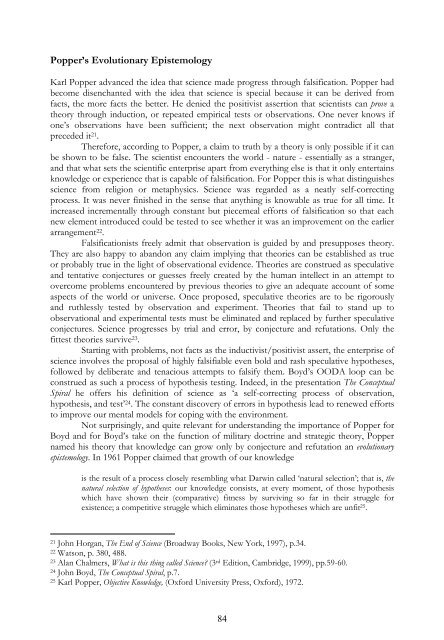Science, Strategy and War The Strategic Theory of ... - Boekje Pienter
Science, Strategy and War The Strategic Theory of ... - Boekje Pienter
Science, Strategy and War The Strategic Theory of ... - Boekje Pienter
You also want an ePaper? Increase the reach of your titles
YUMPU automatically turns print PDFs into web optimized ePapers that Google loves.
Popper’s Evolutionary EpistemologyKarl Popper advanced the idea that science made progress through falsification. Popper hadbecome disenchanted with the idea that science is special because it can be derived fromfacts, the more facts the better. He denied the positivist assertion that scientists can prove atheory through induction, or repeated empirical tests or observations. One never knows ifone’s observations have been sufficient; the next observation might contradict all thatpreceded it 21 .<strong>The</strong>refore, according to Popper, a claim to truth by a theory is only possible if it canbe shown to be false. <strong>The</strong> scientist encounters the world - nature - essentially as a stranger,<strong>and</strong> that what sets the scientific enterprise apart from everything else is that it only entertainsknowledge or experience that is capable <strong>of</strong> falsification. For Popper this is what distinguishesscience from religion or metaphysics. <strong>Science</strong> was regarded as a neatly self-correctingprocess. It was never finished in the sense that anything is knowable as true for all time. Itincreased incrementally through constant but piecemeal efforts <strong>of</strong> falsification so that eachnew element introduced could be tested to see whether it was an improvement on the earlierarrangement 22 .Falsificationists freely admit that observation is guided by <strong>and</strong> presupposes theory.<strong>The</strong>y are also happy to ab<strong>and</strong>on any claim implying that theories can be established as trueor probably true in the light <strong>of</strong> observational evidence. <strong>The</strong>ories are construed as speculative<strong>and</strong> tentative conjectures or guesses freely created by the human intellect in an attempt toovercome problems encountered by previous theories to give an adequate account <strong>of</strong> someaspects <strong>of</strong> the world or universe. Once proposed, speculative theories are to be rigorously<strong>and</strong> ruthlessly tested by observation <strong>and</strong> experiment. <strong>The</strong>ories that fail to st<strong>and</strong> up toobservational <strong>and</strong> experimental tests must be eliminated <strong>and</strong> replaced by further speculativeconjectures. <strong>Science</strong> progresses by trial <strong>and</strong> error, by conjecture <strong>and</strong> refutations. Only thefittest theories survive 23 .Starting with problems, not facts as the inductivist/positivist assert, the enterprise <strong>of</strong>science involves the proposal <strong>of</strong> highly falsifiable even bold <strong>and</strong> rash speculative hypotheses,followed by deliberate <strong>and</strong> tenacious attempts to falsify them. Boyd’s OODA loop can beconstrued as such a process <strong>of</strong> hypothesis testing. Indeed, in the presentation <strong>The</strong> ConceptualSpiral he <strong>of</strong>fers his definition <strong>of</strong> science as ‘a self-correcting process <strong>of</strong> observation,hypothesis, <strong>and</strong> test’ 24 . <strong>The</strong> constant discovery <strong>of</strong> errors in hypothesis lead to renewed effortsto improve our mental models for coping with the environment.Not surprisingly, <strong>and</strong> quite relevant for underst<strong>and</strong>ing the importance <strong>of</strong> Popper forBoyd <strong>and</strong> for Boyd’s take on the function <strong>of</strong> military doctrine <strong>and</strong> strategic theory, Poppernamed his theory that knowledge can grow only by conjecture <strong>and</strong> refutation an evolutionaryepistemology. In 1961 Popper claimed that growth <strong>of</strong> our knowledgeis the result <strong>of</strong> a process closely resembling what Darwin called ‘natural selection’; that is, thenatural selection <strong>of</strong> hypotheses: our knowledge consists, at every moment, <strong>of</strong> those hypothesiswhich have shown their (comparative) fitness by surviving so far in their struggle forexistence; a competitive struggle which eliminates those hypotheses which are unfit 25 .21 John Horgan, <strong>The</strong> End <strong>of</strong> <strong>Science</strong> (Broadway Books, New York, 1997), p.34.22 Watson, p. 380, 488.23 Alan Chalmers, What is this thing called <strong>Science</strong>? (3 rd Edition, Cambridge, 1999), pp.59-60.24 John Boyd, <strong>The</strong> Conceptual Spiral, p.7.25 Karl Popper, Objective Knowledge, (Oxford University Press, Oxford), 1972.84
















